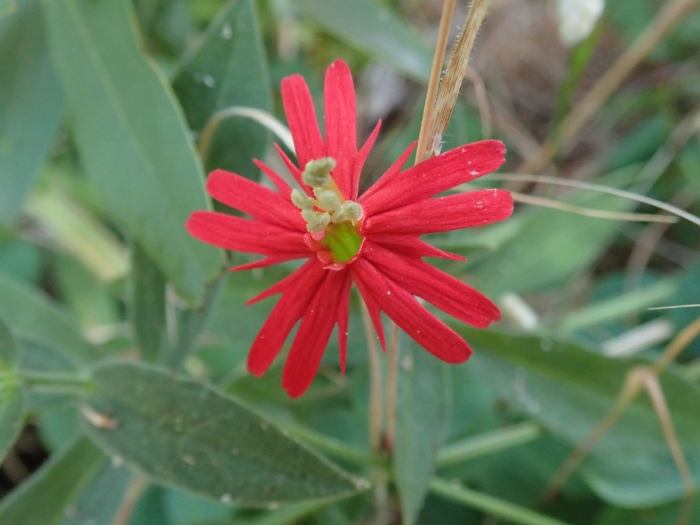Cardinal Catchfly
(Silene laciniata)
Cardinal Catchfly (Silene laciniata)
/
/

joergmlpts
CC BY 4.0
Image By:
joergmlpts
Recorded By:
Copyright:
CC BY 4.0
Copyright Notice:
Photo by: joergmlpts | License Type: CC BY 4.0 | License URL: http://creativecommons.org/licenses/by/4.0/ | Rights Holder: joergmlpts | Publisher: iNaturalist | Date Created: 2021-05-29T17:51Z |




















































Estimated Native Range
Summary
Silene laciniata, commonly known as Cardinal Catchfly, is an evergreen perennial herb native to chaparral and open woodlands in California, the US Southwest, and Mexico. It is adapted to a Mediterranean climate with wet winters and dry summers. Cardinal Catchfly grows from a taproot and produces one or many decumbent to erect stems that can exceed a meter (3 ft.) in height. The slender, branching stem is glandular and sticky, which helps to deter herbivores. The inflorescence may have one flower or many, each on a long pedicel. The flower features a tubular green or reddish calyx of fused sepals lined with ten prominent veins. The five bright red petals are each deeply divided into 4 to 6 long, pointed lobes, sometimes appearing fringed, and bloom from late spring to early fall. The flowers are particularly showy and attract pollinators such as hummingbirds and butterflies.
Cardinal Catchfly is valued for its striking red flowers and ability to thrive in dry, challenging conditions, making it suitable for xeriscaping and drought-tolerant gardens. It is often used in native plant gardens, rock gardens, and as a border plant. This species requires minimal maintenance once established. It prefers full sun exposure and well-drained soils, tolerating a range of soil types from sandy to loamy. While generally pest-free, it can be susceptible to root rot if overwatered or planted in poorly drained soils. Cardinal Catchfly is not known for being invasive outside its native range, but gardeners should always monitor and manage their plantings to prevent unwanted spread.CC BY-SA 4.0
Cardinal Catchfly is valued for its striking red flowers and ability to thrive in dry, challenging conditions, making it suitable for xeriscaping and drought-tolerant gardens. It is often used in native plant gardens, rock gardens, and as a border plant. This species requires minimal maintenance once established. It prefers full sun exposure and well-drained soils, tolerating a range of soil types from sandy to loamy. While generally pest-free, it can be susceptible to root rot if overwatered or planted in poorly drained soils. Cardinal Catchfly is not known for being invasive outside its native range, but gardeners should always monitor and manage their plantings to prevent unwanted spread.CC BY-SA 4.0
Plant Description
- Plant Type: Herb
- Height: 1-2 feet
- Width: 2-3 feet
- Growth Rate: Moderate
- Flower Color: Red
- Flowering Season: Spring, Summer
- Leaf Retention: Evergreen
Growth Requirements
- Sun: Full Sun
- Water: Low
- Drainage: Fast, Medium
Common Uses
Bee Garden, Bird Garden, Butterfly Garden, Hummingbird Garden, Low Maintenance, Rock Garden, Showy Flowers
Natural Habitat
Chaparral and open woodlands in California, the US Southwest, and Mexico
Other Names
Common Names: Fringed Indian Pink , Mexican Campion , Mexican Catchfly , Mexican Pink , Indian-Pink , Mexican-Pink
Scientific Names: Silene laciniata , Silene laciniata var. laciniata , Silene mexicana , Silene laciniata subsp. typica , Lychnis pulchra
GBIF Accepted Name: Silene laciniata Cav.